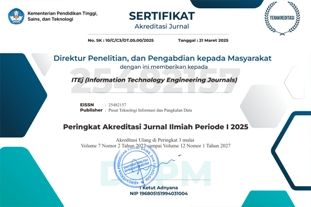The Influence of Android-Based Mobile Learning on Students' Learning Independence on the Subject of Derivative Algebraic Functions
Abstract
The purpose of this research are: 1) to find out how much student’s self regulated learning in using android-based mobile learning, 2) to determine students’ responses about the using of android-based mobile learning in mathematics learning, and 3) to determine whether or not there is an influence of android-based mobile learning on students’ self regulated learning. Metodology in this research is using the experimental method with data collection techniques in the form of questionnaires for the two variables. The population in this research are all students of the clas XI Science in SMAN 1 Astanajapura, while the research sample is XI Science 4 class which was selected using cluster random sampling technic. Based on the results of the research, it can be concluded that the results of the student response questionnaire in using android-based mobile learning show strong criteria with an average percentage of 70.7% and the results of the students’ self regulated learning questionnaire show strong criteria with an average percentage of 73.7%. After hypothesis testing with , it can be seen that the value of is . Because then is rejected and is accepted, meaning that there is a significant influence between the using android-based mobile learning on students’ self regulated learning. The magnitude of the coefficient of determination obtained is 0.423 or 42.3% which means that the using of android-based mobile learning has an effect of 42.3% on students’ self regulated learning and the rest in influenced by other factors.
Keywords: Instructional Media, Android-Based Mobile Learning, Self Regulated Learning
Downloads
References
Rusman, Pembelajaran Tematik Terpadu. Jakarta: Rajawali Pers, 2016.
K. Hidayati and E. Listyani, “Improving Instruments of Students’ Self-Regulated Learning,†J. Penelit. dan Eval. Pendidik., vol. 14, no. 1, pp. 84–100, 2010.
L. Fidiana, S. Bambang, and D. Pratiwi, “Pembuatan dan Implementasi Modul Praktikum Fisika Berbasis Masalah Untuk Meningkatkan Kemandirian Belajar Siswa Kelas XI,†Unnes Phys. Educ. J., vol. 1, no. 2, pp. 38–44, 2012.
Darwan and M. Irfadi, “Perbandingan Pemahaman Siswa Antara yang Menggunakan Software Geogebra dengan yang Tidak Menggunakan Software Geogebra pada Pokok Bahasan SPLDV,†2013.
M. S. I. Rahayu, “Pengembangan Media Pembelajaran Berbasis Mobile Learning Pada Platform Android Sebagai Sumber Belajar Untuk Meningkatkan Kemandirian Belajar Dan Hasil Belajar Fisika Peserta Didik Kelas X,†Universitas Negeri Yogyakarta, 2017.
E. P. Utomo, From Newbie to Advanced. Yogyakarta: CV Andi Offset, 2012.
J. Attewell and C. S. Smith, Mobile Learning Anytime Everywhere. London: Learning and Skills Development Agency, 2004.
E. A. Wibowo and R. Arifudin, “Aplikasi Mobile Learning Berbasis Android,†UNNES J. Math., vol. 5, no. 2, pp. 109–117, 2016.
J. Attewell, Mobile Technologies and Learning. London: Learning and Skills Development Agency, 2005.
H. N. Lengkong, A. A. E. Sinsuw, and A. S. M. Lumenta, “Perancangan Penunjuk Rute Pada Kendaraan Pribadi Menggunakan Aplikasi Mobile GIS Berbasis Android Yang Terintegrasi Pada Google Maps,†E-Journal Tek. Elektro dan Komput., pp. 18–25, 2015.
A. Juansyah, “Pembangunan Aplikasi Child Tracker Berbasis Assisted-Global Positioning System (A-GPS) Dengan Platform Android,†J. Ilm. Komput. dan Inform., vol. 1, no. 1, pp. 1–8, 2015.
A. M. N. Usman, “Pengaruh Metode Kumon Terhadap Kemandirian dan Prestasi Belajar Matematika Siswa Kelas VII Putra SMP Takhassus Nuril Anwar Loano Purworejo Tahun Ajaran 2015/2016,†Universitas Muhammadiyah Purworejo, 2016.
D. Rachmayani, “Penerapan Pembelajaran Reciprocal Teaching Untuk Meningkatkan Kemampuan Komunikasi Matematis Dan Kemandirian Belajar Matematika Siswa,†J. Pendidik. Unsika, vol. 2, no. 1, pp. 13–23, 2014.
R. D. Puspitasari, “Pengaruh Pembelajaran Berbasis Proyek Terhadap Kemandirian Belajar Fisika Peserta Didik Kelas X SMK Negeri 7 Bandar Lampung,†Universitas Islam Negeri Raden Intan Lampung, 2017.
Sugiyono, Metode Penelitian Kuantitatif, Kualitatif, dan R&D. Bandung: Alfabeta, 2018.
Sugiyono, Metode Penelitian Pendidikan. Bandung: Alfabeta, 2015.









